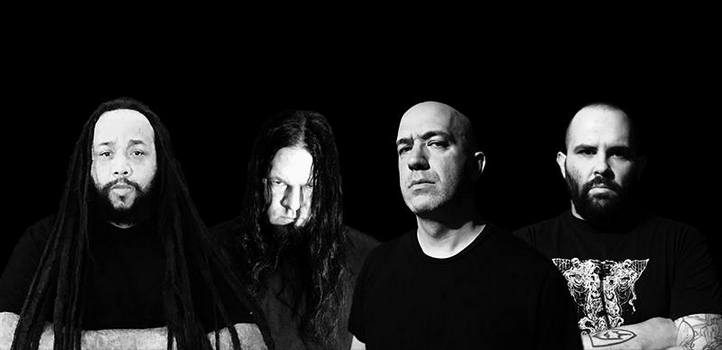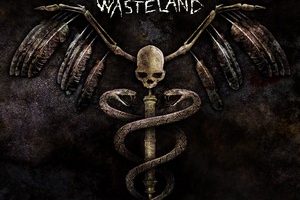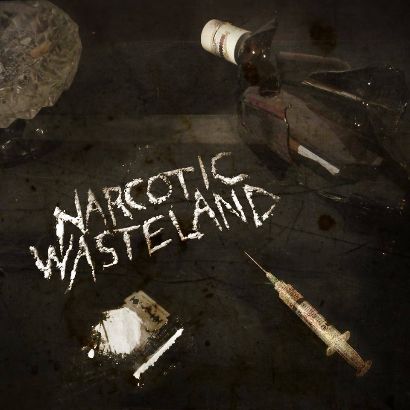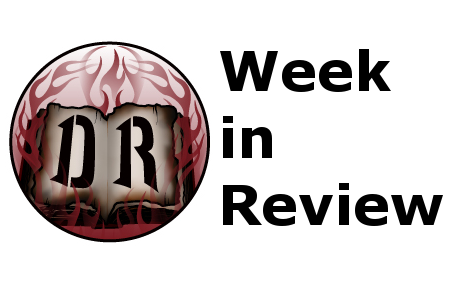Narcotic Wasteland – Faces of Death
Tuesday, 26th September 2017
More often than not, death metal bands have a tendency to stick to the familiar topics. Death, gore, killing – that sort of thing. There’s always exceptions, or bands that have a different take on the subject, but as they say, dark music demands dark themes. Narcotic Wasteland does, for one of its lyical slants, face a slightly different (yet still suiting) take – that of addiction. Plenty of grim to still go around with such a concept, and Narcotic Wasteland hits just as hard sonically as any other death metal act to come through the pipeline.
Founded by Dallas Toler-Wade (he now formerly of Nile), Narcotic Wasteland released their first, self-titled album, back in 2014. Those yearning for something relentless surely found it with said release, and the band is now on the verge of releasing their second album, Delirium Tremens. A focused, tight-knit, and balls-to-the-wall effort that death metal fans should find some visceral comfort in. We chatted with Toler-Wade to discuss the new album, death metal in general, and even what could help curb addition.
Dead Rhetoric: What do you feel are some of the differences with Delirium Tremens, compared to your debut?
Dallas Toler-Wade: I think it’s a little bit more focused overall. We had a bit more direction with what we wanted to achieve. The production is better, the songwriting is better…it’s just overall a bit more in depth from what we were doing last time.
Dead Rhetoric: I’m sure that you are more used to it at this point, but do you feel that the Nile comparisons are inevitable?
Toler-Wade: Yeah, and it doesn’t necessarily bother me. I did some songwriting with Nile and a good bit of the vocals on some of the later albums, so there are going to be some similarities sometimes. I think, on this album, it’s a bit more of a departure. To me, it definitely sounds like something I would do, but Narcotic seems a bit more on the thrashy side of things. A little more straight-forward.
Dead Rhetoric: What are some of the hardships of building a band up from the ground, even as someone who, at least in death metal circles, is pretty well-known?
Toler-Wade: I don’t really know actually. I don’t really view it in those terms. I can say this for the Nile guys too, but basically, it’s what I want to do musically. If I can do it on the level where we can tour, which we do have a tour coming up…if it gets to some level of success, great. If it doesn’t, great. I’m still going to write music, I’m still going to play shows whenever I can. It’s really about that aspect. It’s about musical growth and connecting with the listener and each other, and still trying to improve on what we do.
Dead Rhetoric: I was looking at some old interviews, and something I got out of one of them was that the members in the band, at least some of them, are based on more long-term friendships?
Toler-Wade: Yeah, I’ve known the lead guitarist Ed [Rhone], shit, since I was 16 or 17. We met and we jammed together some. His band and my band would play shows together. We ended up playing in the same band together a couple of times, and things like that. We’ve always had a good friendship and stayed in contact over the years. When I started coming up with this stuff and realized that I wanted to take it past the one-man project sort of deal, he was the first guy I called. We always shared demos back and forth about what we were working on. We all moved away from our hometowns but we kept in touch. Back then, I think it was like [Instant] Messenger and we would send each other mp3s or wavs and stayed in touch that way. He has come out to a few of the Nile shows a few times.
He recommended our bass player Chris [Dupre], who is also from our hometown. I didn’t know him that well back then. I had met him a few times but now we have gotten to know each other. It definitely is about friendship. We got our new drummer Phil [Cancilla]. He tried out a few times last year and it totally worked out. We chat quite often. We have our own Messenger bubble that we call “The Narcotic Lounge” [laughs] and we are always chatting on that if we can’t be in the same room together. We have gotten a lot of work done that way too.
Dead Rhetoric: How did you end up with MegaForce Records for Delirium Tremens?
Toler-Wade: Our booking agency was shopping around a few demos and we had gotten a few offers. Theirs seemed to make the most sense for us, and that’s kind of how that happened.
Dead Rhetoric: I also saw that the first album got re-issued recently through them as well. Was it nice to get the label-backed release out there as opposed to the self-release that came out a few years ago?
Toler-Wade: Absolutely. There’s still a lot of people that don’t even know about it. It definitely helped to give us more of a push on that one. Just to have that and some PR behind everything, it really helped out a lot. Hopefully people will dig the new one the same way they dug the old one.
Dead Rhetoric: Is it freeing in a sense, having been in Nile for so long, to write lyrics that are a bit more personal? As opposed to being more confined to the Egyptian themes?
Toler-Wade: I guess it could be in a way. We [the Nile guys] have all done things that aren’t necessarily related to Nile. George [Kollias] put out a record, Karl [Sanders] had his Saurian thing. I think it’s fun and healthy for people to do different things. Especially in this type of music, it’s totally about freedom. I’ve said this a bazillion times, but Iron Maiden doesn’t always write about Iron Maiden. Nile has even been known to break away from things that were strictly about Egypt. A lot of the stuff with Narcotic Wasteland does has the theme of addiction, but I’ve written a song about a serial killer, there’s one that’s sort of anti-religious. There’s a song on the new record that is actually about being in an underground metal band. I can’t really say that I’ve ever felt limited, but just wanted to do some different things.
Dead Rhetoric: Given the subject matter of some of the lyrics, do you find that people are a little bit more responsive to it? Or that they were helped out by them in a way?
Toler-Wade: I’ve read some comments. Some of them are pretty hilarious. Some are to the point. Some people don’t get it. Some people think that maybe they are stupid, or whatever. One of the things that I didn’t want to do with this band was to have lyrics that were a bunch of fancy, thesaurus words that may sound cool together but actually mean nothing [laughs]. There’s a lot of stuff out there that is like that, and I wanted the message to be very non-poetic and as straight-forward as possible, and talk about some real issues. There were some people that maybe thought we were an anti-party band…someone once compared us to McGruff the Crime Dog or some dumb shit like that. It really wasn’t about that. We aren’t an anti-party band. I enjoy beer [laughs]. It’s not like we are straight-edge or anything.
The real core of it is some of the experiences that I have had, losing some close friends and family to addiction. A lot of it has to do with stuff that is not even on the street – its pharmaceuticals. There’s a song about that – the last song on the new record is called “Pharma Culture” and it is about how pharmaceuticals actually killing more people than street drugs. People are becoming really addicted to it, and a lot of people drink also, which is never good…it creates all sorts of chaos and blackouts. Just about everyone I have talked to knows someone who has had issues at this point. It is more about that.
It is a little bit more personal and some of the comments that I got from people who really did get it said that the lyrics really hit home with them, and it helped them along and they could kind of think about this stuff. Maybe it made them feel like they weren’t alone.
Dead Rhetoric: Which might be strange coming from a death metal type of sound, but it can happen with any type of music.
Toler-Wade: Right. For me, it feels like it fits in kind of the death metal theme because it’s a very toxic subject. It makes people uncomfortable. Death is usually inevitable when serious addiction problems can occur – whether it’s alcohol or pills or anything. So it’s dealing with real death issues too. It kind of fits for me. There has been tens of thousands of bands that talk about Satan and there’s nothing wrong with that. I enjoy quite a bit of that music. But I definitely wanted to do something a bit different and something that was meaningful to me.
Dead Rhetoric: It’s like you said, there’s only so many different fantastical views that you can see. It’s nice to have that feel – to have something that might hit a little bit closer to home for someone than just a complete escape.
Toler-Wade: That’s probably where the line is drawn. Some people are looking for that escape and some people welcome this kind of thing. Lyrically, for me, it’s almost a punk rock approach. Just say what you have to say. It doesn’t have to be fancy – let the music do the rest of the talking.
Dead Rhetoric: What are the goals for Narcotic Wasteland at this point – either in the short or long-term end?
Toler-Wade: Basically, the way that I have looked at any band is to push it as far as it will go. Try to get it to as many people as possible so that they can at least try it out and give it a spin. For any musician who is really serious about sharing what they do with other people, that’s the goal. That’s pretty much the bottom line. If we can get this thing really touring – great. If not, we are still going to write music and play some fucking metal [laughs].
Dead Rhetoric: You left Nile and Narcotic Wasteland became a full-time band. Did you just feel it was time to turn it into a full-fledged band now that you left Nile?
Toler-Wade: Actually, this was a full-fledged band before I left, and I was hoping to kind of do this when I could. That was the original plan – just to have something else to do when Nile had downtime. The bassist, Chris, has another band that he does too. He owns a business and stuff like that. It was a thing that we could all do on the flipside – when we could all get together and weren’t busy with our other stuff. It just kind of happened that we all got freed-up at the same time.
Dead Rhetoric: As someone who has been in the metal world for a while, what do you like about death metal?
Toler-Wade: When I started playing guitar, I was more into punk/thrash/stuff like that. I’m a big fan of DRI to this day; they are one of my favorite bands ever. I started taking some lessons and taking music theory and that’s when I started getting into being able to do solos and things like that. For a while there, I was starting to go into that neo-classical/Shrapnel kind of realm.
The first couple of times that I heard death metal, I didn’t really take it that seriously, and then it really grew on me. I started to really get that it was these beautiful, dark passages in the guitar playing, and just a whole realm of stuff that you can do with it. To this day, it’s still my favorite. I love death metal. Albums like Bolt Thrower – Warmaster and Gorguts – Considered Dead, Suffocation…pretty much their entire discography [laughs], and Immolation of course. These are my top death metal bands; my favorites. They just really had something, and I really dig just the fact that is wasn’t all about the technical prowess and it was more about the feeling. It was angry and aggressive and evil, and I just loved that. Some of the Napalm Death stuff too. They were like the punk death metal band [laughs].
Dead Rhetoric: Considering the “Faces of Meth” and things like that…obviously there’s a problem in the US with drug addiction. Do you feel that there’s a better way we could be looking at it or countering it?
Toler-Wade: The inherent problem with not just drug addiction…serious drugs anyways – I have no problems with marijuana at all, I think it should be legal. It’s less dangerous than alcohol and alcohol is legal. That in itself is the problem. Opiates, and prescribing them to children…or whatever they are doing nowadays. I don’t take any of that shit because I’m terrified of it. But I think the real problem, particularly with a lot of the stuff going on, like racism and media/political agendas, is ignorance and education.
We need better education for everyone. There’s people that live in the middle of the sticks somewhere that don’t have necessarily the best examples to grow up with. It becomes this vicious cycle of the same thing happening again and again because they don’t have any other stimuli. They don’t have any positive stimuli, and that’s how this happens. I think ignorance and education – there’s that one thing I see on Facebook all the time that says, “If you could rid the world of one thing, what would it be?” My reply is always ignorance [laughs].
Dead Rhetoric: You mentioned that you will have a tour this fall – anything else on the radar for the band?
Toler-Wade: We are looking into what is going on for 2018, but for right now, we just have this tour starting on October 21 and it ends on December 9. It’s US and a few dates in Canada. That’s what we are going for. We are definitely going to be talking about what we can do in 2018 as well. But for now, we just want to get this one down [laughs].
Dead Rhetoric: Get the record out and get going.
Toler-Wade: Yeah, like Lemmy said one time, “Fly the flag and see who salutes it.” You never know until you do it. It’s looking pretty good and we’ll have a good chance to get out there and get tight.
Pre-order Delirium Tremens HERE
Narcotic Wasteland on Facebook

























